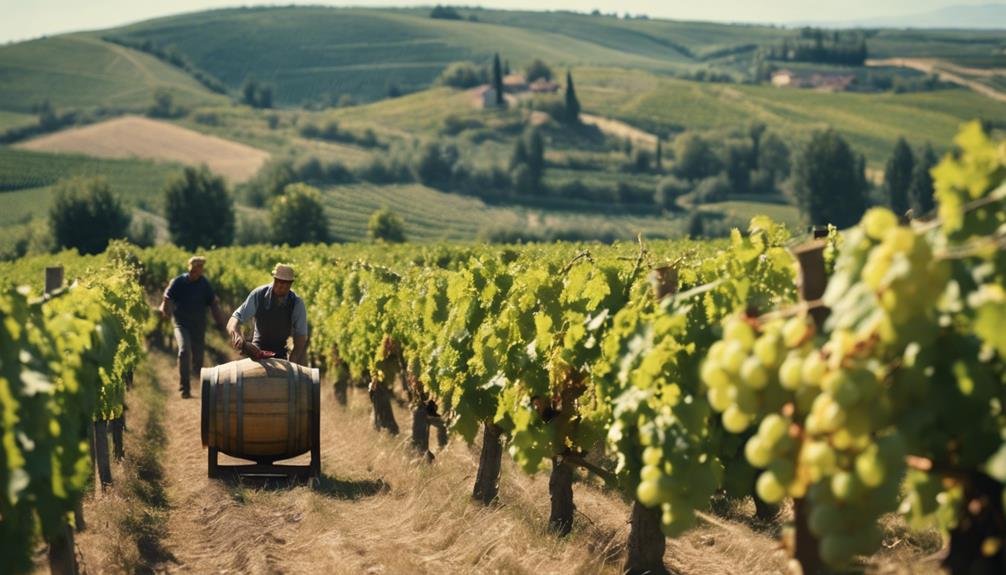Explore Bulgarian wine, a hidden gem blending ancient and modern techniques. Unique terroir in regions like the Thracian Valley cultivates indigenous grapes like Mavrud and Melnik 55, offering distinctive flavors. Red wines, primarily international varieties, dominate with Cabernet Sauvignon and Merlot vines covering 31% of vineyards. The industry, evolving towards quality, plans to separate into nine regions for premium production. With a moderate climate influenced by the Black Sea, Bulgaria's future focuses on quality over quantity. Discover the enigmatic world of Bulgarian wine, where tradition meets innovation for an exciting oenophilic journey.
Bulgarian Wine Regions and Varieties
Bulgarian wine regions boast a diverse array of grape varieties, blending traditional local gems with globally recognized classics, creating a unique and exciting wine landscape. The country's unique terroir provides an ideal environment for cultivating a wide range of indigenous grape varieties.
These local gems, such as Mavrud and Melnik 55, offer distinctive flavors that reflect Bulgaria's rich winemaking heritage. Passionate producers are reintroducing historic native grapes, adding depth and complexity to the wine scene.
Red wines, including the elegant Rubin and the tart Gamza, dominate plantings, with around 70% being international varieties. This blend of tradition and innovation showcases Bulgaria's commitment to quality and diversity in winemaking.
Bulgarian Wine Varietals
With a diverse array of grape varieties, Bulgaria's wine industry showcases a rich tapestry of flavors and profiles that reflect the country's unique terroir and winemaking heritage.
Red wines like Mavrud offer rich wine profiles with cherry and chocolate-like flavors, while Melnik 55 presents elegant notes of strawberry and black pepper.
White wines such as Red Misket provide emerging flavors of mandarin orange and rose water, and Dimyat offers acidity with apple and citrus notes.
Local varietals like Gamza bring tart berry flavors with an herbal profile, and international varieties like Cabernet Sauvignon and Merlot add black cherry fruits with subtle tobacco leaf and vanilla aromas.
Each varietal contributes to Bulgaria's wine scene, showcasing a blend of tradition and innovation in winemaking.
Bulgarian Wine Facts

What key insights can shed light on the vineyard landscape and production of wine in Bulgaria?
Bulgaria boasts around 148,000 acres of vineyards, primarily concentrated in the Thracian Valley PGI. The country benefits from 2,200 to 2,500 sunlight hours annually, nurturing grape development.
Two main wine-growing regions, the Danube Plain and Thracian Valley, shape Bulgaria's wine industry. The moderate temperatures influenced by the Black Sea contribute to mild summers ideal for vine cultivation.
Importantly, Cabernet Sauvignon and Merlot vines cover 31% of the vineyard area, reflecting a preference for international varieties. Understanding the vineyard landscapes and climate influences in Bulgaria is essential for appreciating the diverse and evolving wine production in this hidden gem of a wine region.
Future of Bulgarian Wine Industry
Shaping the trajectory of Bulgaria's wine industry, the evolving landscape and quality-focused initiatives point towards a promising future for the country's viticulture. With temperatures moderated by the Black Sea for mild summers, Bulgarian vineyards are poised to enhance their quality focus. There is a potential plan to separate the industry into 9 total regions, emphasizing a more nuanced approach to winemaking. The low vineyard yields suggest a shift towards premium quality production, aligning with the increasing recognition of Bulgarian wines internationally. This strategic direction towards quality over quantity highlights the vineyard potential in Bulgaria, setting the stage for a bright future in the world of wine.
| Quality Focus | Vineyard Potential |
|---|---|
| Low vineyard yields | Potential separation into 9 regions |
| Emphasis on premium quality | Increasing international recognition |
Wine Folly and Madeline Puckette

Renowned for her James Beard Award-winning authorship and role as Wine Communicator of the Year, Madeline Puckette co-founded Wine Folly with the mission of simplifying wine education and providing accessible resources for enthusiasts worldwide.
With a strong focus on wine education, Wine Folly employs an effective social media strategy under the handle @WineFolly to engage with a global audience. The platform offers valuable wine tasting tips, visual aids, and encourages wine exploration.
Madeline Puckette's expertise has made Wine Folly influential in the wine industry, recognized as a trusted source for wine knowledge. Through their commitment to simplifying complex wine concepts, Wine Folly continues to contribute significantly to wine education on a worldwide scale.
Frequently Asked Questions
What Are Some Traditional Bulgarian Food Pairings With Local Wines?
Traditional Bulgarian recipes, like Shopska Salad with tomatoes, cucumbers, and feta, pair well with local wines. Local ingredients such as yogurt, lamb, and peppers complement the rich flavors of Bulgarian varietals, enhancing the dining experience.
How Does Bulgarias Wine Production Compare to Other European Countries?
When comparing Bulgaria's wine production to other European countries, climate plays an essential role. The country benefits from moderate temperatures influenced by the Black Sea, aiding in quality wine production. Vineyard techniques focus on low yields for premium wines.
Are There Any Sustainability Initiatives in Place Within the Bulgarian Wine Industry?
Sustainable practices and organic farming are gaining momentum in the Bulgarian wine industry. Winemakers are embracing eco-friendly initiatives to combat climate change. The focus on sustainability aims to preserve the environment and produce high-quality wines.
What Is the Significance of the Thracian Valley PGI in Bulgarias Wine Landscape?
The Thracian Valley PGI holds significance in Bulgaria's wine landscape due to its unique terroir, producing wines shaped by the Black Sea's influence. It plays a pivotal role in Bulgarian wine tourism, attracting enthusiasts with exceptional wine experiences.
How Has Madeline Puckettes Work With Wine Folly Impacted the Bulgarian Wine Market?
Madeline Puckette's work with Wine Folly has greatly impacted the Bulgarian wine market through her influence on wine education, marketing strategies, and overall industry recognition. Her efforts have elevated awareness and appreciation for Bulgarian wines globally.
Conclusion
To sum up, Bulgaria's wine industry is a hidden gem waiting to be discovered by wine enthusiasts worldwide. With a rich history, diverse varieties, and a promising future, Bulgarian wines offer exceptional quality and value.
Like a fine wine that matures with time, Bulgaria's winemaking tradition continues to evolve, embodying a unique blend of tradition and innovation. As global recognition grows, Bulgaria's wines stand poised to shine brightly on the world stage, showcasing their distinctive characteristics and untapped potential.